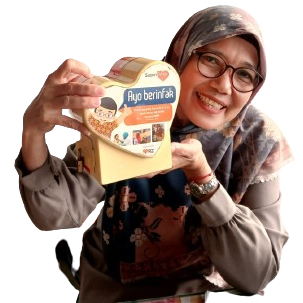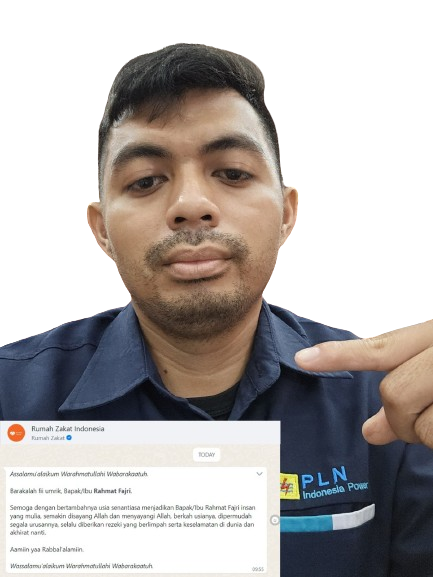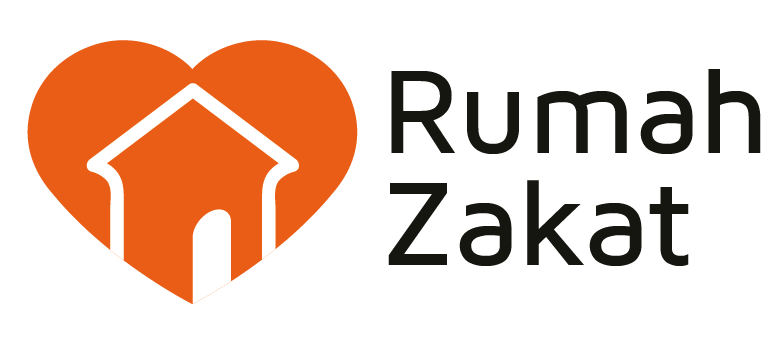Donor Services
Choose the following services and conveniences
![]()
Zakat Calculator
Calculate your zakat accurately with our zakat calculator
![]()
Zakat Consultation
Enjoy zakat consultation services through our WhatsApp channel
![]()
Care Donor
Need assistance with your donation? Feel free to contact us.
![]()
Confirm Donation
Confirm your donation for a fast and accurate distribution process.
Their reviews
Check out their reviews about Rumah Zakat


Regy Sindy Wijaya
Becoming an institution that is trusted by the community is not easy, but Rumah Zakat has ..

Bima Pratama
Alhamdulillah.. May the Rumah Zakat Team be more successful and fisabilillah, and may Allah give abundant rewards to the entire Team..

Devi Safitri
Thank you Rumah Zakat as a trusted zakat collection institution, which has helped me to always be steadfast (in shaa Allah) to be able to share happiness through this zakat box.

Satria Megha
"Bismillaah. I have known Rumah Zakat since it was still called Dompet Sosial Ummul Quro.

Farah Aliyah Syahidah
"I have been involved in the Rumah Zakat volunteer program since 2017. Now, thank God, I have been given the mandate of Allah to join another RZ program...

Vina Oktaviani
With the existence of Rumah Zakat, I feel helped in distributing zakat and alms online.

Rista Lestari
Alhamdulillah barakallahu fiikum.. may Allah continue to carry out the good efforts of all Rumah Zakat friends Aamiin

Baiq Nurainun Apriani
Rumah Zakat is a trusted zakat collection institution, focusing on managing zakat, infaq and alms.

Gatot
Rumah Zakat provides convenience for donors through the programs offered

Rahmat Fajri
Thank you Rumah Zakat (RZ) Indonesia for helping me become a bridge with the recipients...

Dr. Meitria Syahadatina Noor, dr., M. Kes.
I would like to express my deepest gratitude and appreciation to Rumah Zakat for its extraordinary social activities.
Help Us Become Better
Feel free to give your suggestions and feedback to help Rumah Zakat improve!
Or follow the questionnaire below!
**Rumah Zakat Service Improvement Questionnaire
FAQ
FAQ Donation
What if you have transferred but forgot to use the unique code?
InsyaAllah, your donation will still be received by the intended Rumah Zakat account. However, for easier verification, please kindly confirm your donation through Rumah Zakat's contact center (WhatsApp Center: +62 815 7300 1555, Email: welcome@rumahzakat.org).
Is it necessary to confirm after donating via transfer to Rumah Zakat's account?
Every donor who donates via transfer to Rumah Zakat's account is encouraged to confirm the donation through the WhatsApp Center: +62 815 7300 1555, so that the donation can be accurately recorded in the system. For donors who do not confirm their donation, the funds will still be recorded, but under the name of "Hamba Allah."
How do you donate online at Rumah Zakat?
- Click https://www.rumahzakat.org/donasi
- Choose the desired donation campaign.
- Enter the donation amount → click “Donate Now.”
- Fill in your personal details and ensure they are correct.
- Select your preferred transaction notification method.
- Enter your prayer.
- Select the option “Include Infak” if you want to add infak. Alternatively, choose “Later” if you do not wish to add infak.
- Choose your payment method.
- Proceed with the payment.
FAQ Qurban
What is the ruling on sacrificial worship?
Qurbani is sunnah, not obligatory. Imam Malik, Ash-Shafi'i, Abu Yusuf, Ishak bin Rahawaih, Ibnul Mundzir, Ibn Hazm, and others said, "qurban is sunnah for people who are able (rich), not obligatory, whether the person is in his hometown ( muqim), while traveling (musafir), or while performing the Hajj.”
What is the ruling on qurban for those who can afford it?
The majority of scholars from among the companions, tabi'in, tabiit tabi'in, and fuqaha (fiqh experts) stated that for people who are capable the law of sacrificial worship is Sunnah Muakaddah.
When did sacrificial worship become obligatory
1. If you have vowed to perform a sacrifice, as per the hadith: "A person who vows to obey Allah, let him carry out that obedience, and if he vows to commit a sin then do not commit a sin" (HR Al-Bukhari).
2.If you intend to sacrifice.
What are the requirements for sacrificial animals?
Animals that can be sacrificed are: camels, cows and goats (or sheep) whether male or female. For goats/sheep aged 1 year entering the second year, cows (or buffalo) aged 2 years entering the third year and for camels aged 5 years.
What kind of animals are prohibited from being used as sacrifices?
There are 4 things that are not permitted in sacrificing: blindness in one eye that is clearly blind, pain that is clearly painful, limping that is clearly limping and being thin and not fat (HR. Abu Dawud).
Is it permissible to sacrifice for joint ventures?
Yes, a cow can be intended for 7 people, as in the following hadith: "From Jabin, he said: we were with Rosululloh SAW in the year of Hudaibiyyah a cow for 7 people and a fat camel for 7 people" (HR Muslim, At-Tirmidhi , Abu Dawud and Ahmad).
When is the time for slaughtering sacrificial animals?
It is held after the Eid al-Adha prayer on the 10th of Dzulhijjah until the end of Tasyriq (before Maghrib), namely the 13th of Dzulhijjah.
What about sacrificial meat in the form of corned beef and/or rendang?
This is permissible, considering Rosululloh's command regarding the use of sacrificial meat as follows: "Eat it, save it for supplies and do charity" (HR Bukhari Muslim).
Cornetization of sacrificial meat is an effort to manage udhhiyah meat so that it can provide benefits for longer and be more widely distributed.
What about the distribution of sacrificial meat outside of the sacrificial holiday?
It is permissible, based on the hadith narrated by Bukhari Muslim, Aisyah r.a. narrated, "In the past we used to marinate sacrificial meat so we took it to Medina." Suddenly the Prophet SAW said "do not finish the udhhiyah meat in just 3 days". This hadith further strengthens the idea of packaging the qurban for a long period of time so that it can be used in the long term.
What is the difference between qurban and aqiqah?
The difference in the time of slaughtering the animal, if the sacrificial animal is slaughtered on 10, 11, 12 and 13 Dzulhijjah, it is sunnah to perform the aqiqah on the seventh day of the child's birth or on other days when the child's guardian is able to carry it out. For types of animals, aqiqah can only use goats, while qurban can use camels, cows, goats.
Which comes first, aqiqah or sacrifice?
If it is time for sacrifice, then the sacrifice comes first. However, if you have excess assets, you can do both.
What is Superqurban?
Superqurban is a program to optimize qurban by processing and packaging sacrificial meat into food reserves from animal protein in the form of corned beef and rendang (only for Superqurban 1/7 cow or whole cow). The meat of sacrificial animals is useful for longer and can be distributed more widely.
What are the advantages of Superqurban?
· Sharia compliant (animals are slaughtered in healthy condition)
· Practical
· Guaranteed health
· Corned beef lasts up to 2 years
· Rendang lasts up to 2 years
· Distribution actions are carried out throughout the year
· Reaching remote areas of Indonesia
· Distributed to disaster victims and other humanitarian programs at home and abroad
· Empowering local breeders
· An effective solution to help disaster victims and can be used as a company tool in holding environmental awareness actions
For the Superqurban program, how many rights does the person performing the Qurban receive?
· 10 cans of corned goat
· Corned beef 1/7 as much as 10 cans
· 50 cans of whole corned beef
· 10 cans of goat rendang
· 1/7 beef rendang as much as 10 cans
· 40 cans of whole beef rendang
For the Superqurban program, when does the person performing the Qurban get their qurbani rights?
InsyaAllah, the sacrificial right will be sent and or can be collected D+90 after the day of Tasyrik.
What is Desaku Berqurban?
Desaku Berqurban is a sacrificial worship program, here the results of sacrificial meat are distributed to villages with few Qurban participants.
Where is the location for Superqurban animal slaughter and Desaku Berqurban?
- The slaughtering locations for Superqurban animals are: goats in Cimenyan, Bandung, and cattle in Kupang.
- The slaughtering locations for Desaku Berqurban are spread across the Desa Berdaya (Empowered Villages) by Rumah Zakat.
Does the person performing the Qurban get his sacrificial rights?
- For the Desaku Berqurban program, the person performing the Qurban does not get the right to sacrifice, as all the Qurban meat is distributed to villages with few Qurban participants.
- For the Superqurban program, the person performing the Qurban will get the right to sacrifice in the form of packaged corned beef and rendang.
When does the person performing the Qurban receive information about the slaughtering?
The person performing the Qurban receives information about the slaughtering from the 1st day to the 3rd day of Tashreeq (H to H+3) via WhatsApp, SMS, and/or email.
When does the person performing the Qurban receive the Qurban report?
- The Qurban report can be accessed by all network representatives of the organization and donors on the application at www.rumahzakat.org/care/donasisaya no later than 14 days after the last day of Tashreeq or the last day of animal slaughter. Donors will be informed through SMS, WhatsApp, or email beforehand.
How can the person performing the Qurban access the Qurban report?
- The Qurban report can be downloaded by the person performing the Qurban from the application at www.rumahzakat.org/care/donasisaya by selecting "My Report Qurban" and choosing the Qurban period.
- All Qurban participants will receive information via SMS, WhatsApp, or email when the report is ready to be downloaded from the application.
- If the donor chooses email, the report will be sent via email.
- If the donor does not choose email but has WhatsApp, the report will be sent via WhatsApp.
- If the Qurban participant does not have an email address or WhatsApp, the report will be sent via postal service.
- Any changes to the reporting media will be communicated subsequently.
What if the person performing the Qurban forgets their email when trying to access the Qurban report?
The person performing the Qurban can contact Rumah Zakat staff or reach out to the WhatsApp Center at 0815 7300 1555.
What if the qurban report cannot be accessed?
The person performing the Qurban can contact Rumah Zakat staff or reach out to the WhatsApp Center at 0815 7300 1555 if they are unable to access the Qurban report.
FAQ Donation History
How can users check their donation history via the Rumah Zakat application if they forget their password?
- Click Log in.
- Enter the registered email.
- Check the terms and conditions box.
- Click “Next”.
- Select “Forgot Password”.
- Enter the OTP code sent via email.
- Create a new password.
- Click “Sign In”.
- Select the “Payment Status” menu.
- Choose the “ZISWAF Recap” menu.
- Select the ZISWAF category to view the transaction history.
How can users who have already logged in check their donation history via the Rumah Zakat application?
- Click Log in.
- Enter the registered email.
- Check the terms and conditions box.
- Click “Next”.
- Enter the password.
- Click “Sign In”.
- Select the “Payment Status” menu.
- Choose the “ZISWAF Recap” menu.
- Select the ZISWAF category to view the transaction history.
How can users check their donation history via the Rumah Zakat website?
- Go to the donor login menu.
- Enter the email registered with Rumah Zakat.
- For those who have never logged in before, enter the OTP code sent to the provided email.
- For those who have logged in before, use the “Use Google” button to log in.
- Select the “My Donations” menu.
- Click the “Filter” icon (near the total donations).
- Set the desired date range for the total donations.
- Select the “ZISWAF Recap” menu.
- Click “Apply”.
What should be done if the donation history does not appear on the Rumah Zakat website/application?
If your transaction history is lost or doesn't appear, don't worry, because you can do the following things:
- Make sure the internet connection is stable. If you have several different types of internet networks, try accessing the website using a different network.
- Try logging out/out of your friend's account first then logging in/in again.
If you are still having problems, friends can contact us via WhatsApp: 0815 7300 1555
FAQ Zakat, Infak, Shodaqoh
What is the difference between Zakat, Infaq and Shodaqoh?
- Zakat is obligatory, so if you don't do it you will be sinning. Meanwhile, infaq and alms are not obligatory.
- Zakat is included in the pillars of Islam (the third pillar of Islam), while infaq and alms are not.
- Zakat has a nishab or special provisions regarding the minimum limit of assets and time that must be spent. Meanwhile donations and alms are not.
- Zakat recipients have been determined by Islamic law, namely 8 mustahik groups. Meanwhile, there are no special provisions for infaq and alms, so there are no restrictions on recipients, they can be given to anyone.
- Zakat is specific regarding certain assets and there are rules, so its meaning is very specific, for example: gold zakat, agricultural zakat, income zakat, etc.
How many types of zakat are there?
- Income Zakat
- Zakat on Savings/Savings
- Trade Zakat
- Agricultural Zakat
- Gold and Silver Zakat
- Zakat on Gifts
- Zakat on Shares and Investments
- Zakat Fitrah
For more details, friends can visit the following link https://www.rumahzakat.org/id/zakat/pengenalan-zakat
What are the requirements for fulfilling zakat?
Friends can visit the following link for more detailed information regarding the requirements for fulfilling zakat https://www.rumahzakat.org/id/pengertian-dan-term-sah-zakat
How many types of infak are there?
Infaq is divided into two types
- Obligatory donations (for example: kafarat, nadzar, zakat, etc.),
- Sunnah donations (for example: donations to the poor, donations to fellow Muslims, donations to natural disasters, etc.). This donation can be for the benefit of yourself, your family and other people. This infaq is in the form of property.
How many types of alms are there?
As for alms, the meaning is broader than zakat and infaq. This alms can include zakat, infaq, or kindness in non-material form (for example: alms of energy, thoughts, knowledge, help, even alms of smiles). Alms can also be any form of spending (infaq) in the way of Allah.
What is meant by Muzakki?
Muzakki is a person who is obliged to pay zakat on his property ownership.
Who are the groups entitled to receive zakat?
Mustahik are a group of people who are entitled to receive assistance from zakat.
What is meant by Mustahik?
- Fakir: People who have no source of income and do not meet their daily needs.
- Poor: People who have a source of income but cannot fulfill their daily needs.
- Gharimin: People who are in debt, there are 2 groups of gharim, namely:
- Ghârim li maslahati nafsihi: Being in debt for one's benefit or needs.
- Ghârim li ishlâhi dzatil bain: Being in debt because of reconciling people, qabilah or tribes.
- Riqab: They are someone who is employed and deserves to receive zakat to provide a decent living.
- Fisabillah: They are a person or an institution that has activities with the aim of fighting in the path of Allah. For example, upholding the Islamic religion.
- Converts: Converts are the term for people who have recently converted to Islam. Giving zakat is intended to provide and support the strengthening of their faith and piety in embracing Islam.
- Amil Zakat: Amil is a person who has the task of collecting zakat from muzakki.
- Ibnu Sabil: They are people who are on a journey and have run out of supplies.
FAQ Rumah Zakat Apps
The Rumah Zakat application cannot be opened, what should be done?
- If you can't open the Rumah Zakat application, make sure your internet connection is stable. If you have several different types of internet networks, try accessing the application using a different network.
- If you still have transactions that have not been successfully processed, then there is no need to worry. Friend's transactions will not be lost, transactions will still be processed when the IT team has resolved the problem.
Friends, you can try checking periodically to open the Rumah Zakat application and check the status of your transactions.
What should be done if the donation history does not appear in the Rumah Zakat application?
If your transaction history is lost or doesn't appear, don't worry, because you can do the following things:
- Make sure the internet connection is stable. If you have several different types of internet networks, try accessing the website using a different network.
- Try logging out/out of your friend's account first then logging in/in again.
If you are still having problems, friends can contact us via our WA Center on 081573001555.
Why is my donation status in the Rumah Zakat application still marked as unpaid even though I have already made the payment?
Friends, you don't need to worry, InsyaAllah your donations that have been given will still go into the Rumah Zakat account, but only the recording in the system is still in the waiting process. If within 1 x 24 hours your friend's donation status has not changed, please contact our WA Center on 081573001555.
Why was my donation status in the Rumah Zakat application cancelled?
This is due to problems with our system which causes the funds deposited by friends to experience transaction delays and if it has not been verified for more than 1 x 24 hours then the friend's transaction will be canceled in the application system.
Friends, you don't need to worry, God willing, friends' donations that have been given will still go into the Rumah Zakat account and if it has been verified, friends will get a notification.
Why after donating via the Rumah Zakat application I didn't get any notification?
If friends experience this problem, you can contact our WA Center on 081573001555.
How do I download proof of my donation?
Friends can follow these steps:
- Enter the profile menu
- Ziswaf history
- Select "Accepted"
- Download receipt
FAQ Fidyah
How do you calculate fidyah?
Fidyah is calculated based on the number of days of fasting that cannot be done multiplied by the number of staple foods usually consumed in one day. For Rumah Zakat itself, fidyah is calculated at IDR 50,000 per day
What should be done if someone is unable to pay fidyah?
If someone is unable to pay fidyah, then he is not obliged to pay fidyah. However, he should try to fast if conditions permit.
What is the amount of fidyah that must be paid?
a. Fidyah levels are returned to the 'urf (traditions/customs) of the local community as long as these levels still have a sharia basis.
b. Fidyah value in the form of staple food, if nominalized refers to:
1) Type of staple food consumed by muzzaki.
2) Follow regulatory provisions (if there is a circular issued by an authorized institution) or in accordance with the general price of rice in the local market.
Are there other alternatives to paying fidyah other than with money?
Yes, apart from money, fidyah can also be paid by giving food to people in need.
Is there a time limit for paying fidyah?
Provisions for time limits for fidyah:
a. The quickest time for someone to pay fidyah is on the day he is not fasting during Ramadan.
b. The final time for fidyah payment is not limited because fidyah does not have to be fulfilled in the month of Ramadan.
Does fidyah have to be paid to people in need or can it be paid to charitable organizations?
Fidyah can be paid to people in need or through Rumah Zakat which will distribute it to people in need.
Are there any laws governing fidyah?
Fidyah is regulated in the Al-Qur'an Surah Al-Baqarah verse 184:
"And (required) for those who are hard at observing it (fasting) may pay fidyah, (namely): feeding a poor person. Whoever willingly gives more (than what is required), then it is better for him. But if you know (that fasting is better) it is certainly better for you to fast. And fasting is better for you if you know."
How do you donate online at Rumah Zakat?
1. Click https://www.rumahzakat.org/donasi
2. Select the Ramadan menu
3. Select the fidyah program
4. Enter the amount of fasting debt à click "Cash Now"
5. Fill in your personal data and make sure the data is filled in correctly
6. Select the transaction notification media
7. Complete the prayer
8. Select the "Participate in Infaq" option if you want to add an infaq. Or choose the “Next time” option if you don't add an infaq
9. Choose a payment method
10. Continue payment
Lenny Marlina
Semoga Rumah Zakat selalu memberikan inspirasi banyak orang…berkah dalam kebaikan dan timnya diberikan kesehatan mengemban Amanah mulia yg belum tentu orang mau lakukan ..hanya Allah SWat yg bisa membalasnya ..sehat sehat and happy selalu…sukses terus buat rumah zakat 😊🤲
Regy Sindy Wijaya
Menjadi lembaga yang terpercaya oleh masyarakat sangatlah tidak mudah, namun Rumah Zakat telah memberikan bukti dan saya membuktikannya dengan selalu ikutserta menyalurkan zakat penghasilan saya kepada Rumah Zakat untuk program programnya yang sangat bermanfaat bagi masyarakat yang membutuhkan. Terima kasih Rumah Zakat…
Satria Megha
“Bismillaah. Saya mengenal Rumah Zakat sejak masih bernama Dompet Sosial Ummul Quro.
Tahun 1998, ayah saya meninggal ketika saya masih duduk di bangku SMA dan saya harus bekerja di pasar Cicadas (sekarang pasar tradisional BTM) untuk biaya hidup keluarga, sementara adik-adik saya masih berusia 6 & 8 tahun.
Saat itu kondisi perekonomian kami sangat membutuhkan bantuan, qadarullaah keluarga kami dipertemukan dengan izin Allah untuk dibantu oleh Dompet Sosial Ummul Quro pada tahun 2001 dimana saya mulai berkuliah di salah satu perguruan tinggi negeri di Kota Bandung.
Alhamdulillaah setelah lulus kuliah 2004 saya mulai bekerja hingga saat ini & menjadi pihak yang mempercayakan zakat penghasilan, infaq & atau shadaqah melalui pengelolaan Rumah Zakat yang dilengkapi oleh petugas yang ramah, amanah, mudah dihubungi, sangat membantu & selalu memberikan informasi, edukasi, maupun reminder terkait zakat, infaq & shadaqah. Semoga Rumah Zakat semakin diberikan banyak keberkahan, istiqamah dalam penyaluran kepada yang membutuhkan, barakallaah.?
Dr. Meitria Syahadatina Noor, dr., M. Kes.
Saya ingin menyampaikan rasa terima kasih dan apresiasi yang mendalam kepada Rumah Zakat atas kegiatan sosial yang luar biasa.
Alhamdulilah Saya selalu dilibatkan dalam program-program yang telah diselenggarakan. Melalui beasiswa yang diberikan, anak-anak saya kini bisa mendapatkan pendidikan yang lebih baik dan berkualitas.
Selain itu, program sosial lain seperti kurban untuk desa yang tertinggal juga sangat membantu masyarakat. Kegiatan Rumah Zakat benar-benar memberikan dampak positif yang nyata bagi kami.
Saya berharap kegiatan ini terus berlanjut dan bisa membantu lebih banyak orang yang membutuhkan. Terima kasih Rumah Zakat atas dedikasi dan kepeduliannya.
Farah Aliyah Syahidah
“Saya pernah ikut program volunteer rumah zakat sejak 2017. Sekarang alhamdulillah diberi amanah Allah ikut program RZ yang lain.
Saya merasakan sekali program RZ disalurkan dengan tepat dan perjuangan volunteer nya luar biasa menyasar desa-desa terpencil tidak hanya numpang foto tapi betul-betul bekerja.
2023 saya pernah ajak kerjasama dengan Goes Study memberikan konseling ke panti asuhan dan RZ dengan tangan terbuka mau. Semoga Allah balas lebih baik aamiin.”
Rahmat Fajri
Terimakasih rumah zakat (rz) indonesia yang membantu saya menjadi jembatan dengan penerima.
Banyak sekali program pemberdayaan di rumah zakat. Tidak hanya melulu masalah zakat mal, rz pny super qurban yang bisa jadi logistik saat bencana, rz juga punya rumah aqiqah sebagai solusi bagi yang akan menyelenggarakan aqiqah.
Saya bangga menjadi bagian dari keluarga rz yang punya laporan keuangan wajar tanpa pengecualian 18 kali berturut-turut. Jaga semangat rz selalu jadi lembaga yang amanah, terimakasih ucapannya di hari ini 23 juli 2024.
Vina Oktaviani
Dengan adanya Rumah Zakat saya merasa terbantu dalam menyalurkan zakat dan sedekah secara online.
Dapat menghitung zakat secara akurat dan menyalurkannya kepada mereka yang membutuhkan melalui berbagai program pemberdayaan.
Dengan adanya layanan online Rumah Zakat ini tidak hanya prosesnya yang lebih praktis namun juga memberikan keyakinan bahwa bantuan saya sampai kepada yang membutuhkan dengan tepat.
Baiq Nurainun Apriani
Rumah Zakat merupakan lembaga amil zakat yang terpercaya, focus pengelolaan zakat, infaq dan sedekah disalurkan ke beberapa program yang dibuat tidak hanya pemberdayaan ekonomi namun bidang juga peningkatan Pendidikan, Kesehatan dan lingkungan menjadi perhatian dalam meningkatkan kesejahteraan umat

